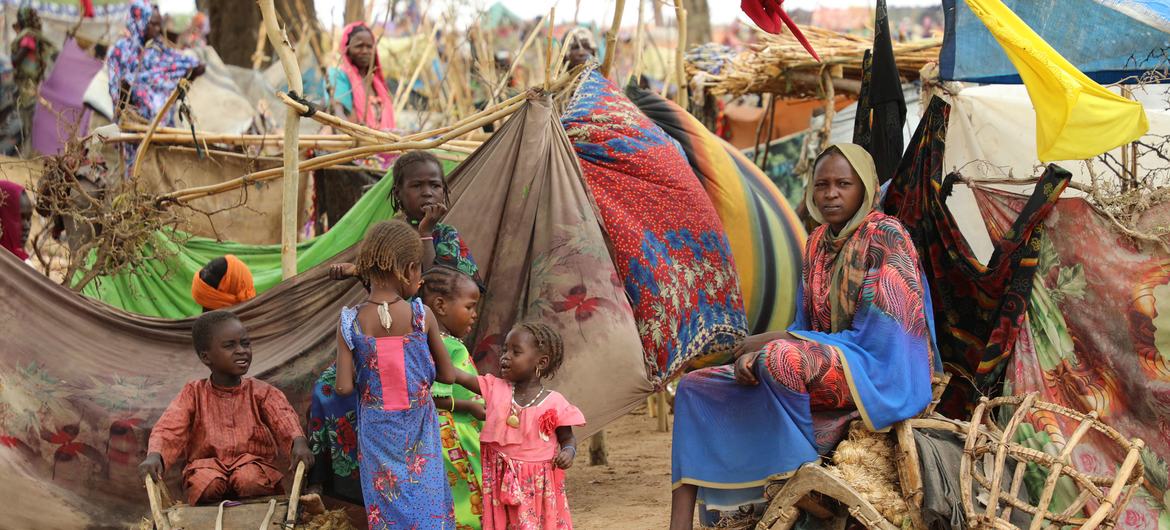Sudan’s deadliest conflict in years entered its fourth month on Saturday following at least 10 failed ceasefires.
Qatar Charity (QC) dispatched a new batch of food aid to Sudan on Monday as fighting raged on despite international efforts to halt the ongoing violence.
The Qatari entity distributed 1,200 food baskets to those affected by the conflict in Khartoum and civilians displaced in the River Nile State, Doha’s state news agency (QNA) reported.
At least 6,000 people benefitted from the Qatari donation, which was distributed under the supervision of the Sheikha Aisha bint Hamad Al Attiyah City Center (Rofaqa) – established by QC in 2017 for orphans and their families in Nile River State.
“About 450 families have been provided with food rations in the village of Rofaqa – established by QC, pointing out that Qatar Charity continues its efforts to support shelter centres, as well as neighbourhoods that host families in Ad-Damar district,” QNA reported, citing Tahani Mirgani, the Sudanese state’s minister of social development.
Othman Muhammad Othman, an official in Ad-Damar district, added that there is a major demand for food and medicine amid a daily increase of displaced people coming into the town from Khartoum.
QC is also implementing a number of water and sanitation projects in addition to mobile clinics and central kitchens to support those fleeing fighting in the capital.
Failed ceasefires
Sudan’s deadliest conflict in years entered its fourth month on Saturday following at least 10 failed ceasefires, leading to a mounting death toll that has surpassed 3,000.
The fighting broke out on 15 April amid a power struggle between the Sudanese army, headed by General Abdel Fattah Al-Burhan, and the Rapid Support Forces (RSF), a paramilitary unit led by former militia leader General Mohamed Hamdan Dagalo, widely known as Hemedti.
The conflict led to the displacement of at least three million people, per an estimate by the International Organization for Migration (IOM).
Saudi Arabia and the United States have been at the forefront of mediation efforts since the beginning of the conflict and managed to produce a short-term ceasefire agreement in Jeddah in May.
The agreement however quickly collapsed and fighting intensified on the ground.
However, sources told AFP on Saturday that the warring sides have returned to the table of negotiations in Saudi Arabia, though there have been no updates on the reported talks.
“A delegation of the armed forces has returned to Jeddah to resume negotiations with Rapid Support Forces (RSF) rebels,” a government source told the French news agency.
Meanwhile, Egypt brought together Sudan’s neighbouring countries -Ethiopia, South Sudan, Chad, Eritrea, the Central African Republic and Libya – in a summit on Thursday, during which the participating parties agreed on a new Egyptian-led initiative aimed at ending Sudan’s deadliest conflict in years.
Fighting rages on
On the ground, fighting continued to rage on in the Darfur region on Saturday despite global efforts to end the violence, AFP reported, citing witnesses.
The witnesses said they had spotted army fighter jets targeting RSF’s bases, which in turn “responded with anti-aircraft weapons.”
Another witness said on Monday that the RSF captured control of Kas, a town in South Darfur, forcing 5,000 households to flee, per a Reuters report.
Reports on the rise in violence in Darfur came just days after the United Nations announced the discovery of a mass grave of dozens of bodies allegedly killed by the RSF and its allies in West Darfur, one of the main sites of the conflict.
The International Criminal Court’s (ICC) prosecutor Karim Khan said on Thursday that the body is investigating new war crimes and crimes against humanity in the region, the Associated Press reported.
That announcement came days after Human Rights Watch (HRW) called on the court to investigate new war crimes in Darfur and the killing of “at least 28 ethnic Massalit”.
Martin Griffiths, UN Under-Secretary-General for Humanitarian Affairs and Emergency Relief Coordinator, expressed on Saturday fears of the “resurgence of ethnic killings in the region” in response to the damning report.
“Each day the fighting continues, the misery deepens for Sudanese civilians[…]We must all redouble our efforts to ensure that the conflict in Sudan does not spiral into a brutal and interminable civil war with grave consequences for the region,” the UN official said in response to the latest harrowing discovery.







